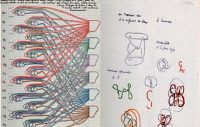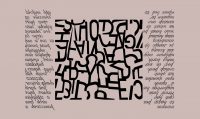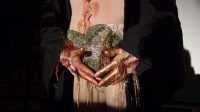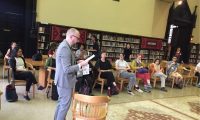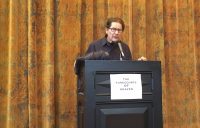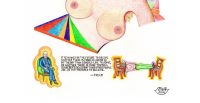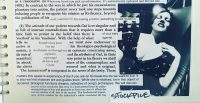The Unbejection’s Presentorsion Discustshine of Shock Lacan’s Famisslie Diffuckult Teckst: L’ETOURDIT
Summary by Evan Malater: With L’etourdit we find Lacan giving an address in the form of a hypercondensed recapitulation of his life’s thinking till that time (1972) with the added surprise that since he was secretly working on Joyce, the language was hypercharged with puns, overdeterminations, indeterminacy and enigmas galore, only he forgot to tell anyone he was going to be trying out his Joyce act, to the apparent befuddlement of even those well prepared for Lacanian rhetoric. Although we in contrast were prepared for the worst by way of various disclaimers on how hard the material was, the panel presented an extremely rigorous and grounded series of conceptual mappings by which we were able to make our way together. In the second half, Jamieson and Patricia deftly presented ...Read More
The Candidate Journal (Issue 7): “The Candidate, Barred”
It is our pleasure to announce the online release of Issue 7 of The Candidate Journal, titled “The Candidate, Barred.” Under the new editorial board, this issue of the journal considered questions that implicitly underlie the journal’s formation and perspective: that is, the notion of psychoanalytic candidacy and what is implied or assumed in being a candidate. Click here to read Issue 7 of The Candidate Journal: ” The Candidate, Barred” Editors: Anna Fishzon, PhD, Emma Lieber, PhD, Olga Poznansky, PhD TABLE OF CONTENTS: THE CANDIDATE JOURNAL Volume 7 The Candidate,” or, “The Candidate, Barred INTRODUCTION 1 Editors’ Introduction Anna Fishzon, PhD, Emma Lieber, PhD, and Olga Poznansky, PhD THEORIZING TRAINING 8 Training and Time Jared Russell, PhD 16 Questions Raise...Read More
Schreber Live! Patrick Scanlon “Granted – From Glory to Grandeur”
This expanded cinema piece explores the materiality of light in the shadow of Schreber’s Memoirs. Additionally, the character of Judge Schreber is represented in costume, encouraging spectators to play with the film itself, refracting and reflecting the projector’s rays of light. Costume by Bekah Carey, a costume designer/wig maker for Eastman School of Music and Geva Theater in Rochester, working in New York City. Photos by Kyle Corea, a filmmaker who works with video, 16mm, and Super 8mm in New York City. Click here to read performance text
Schreber Live! Felix Bernstein, Patricia Gherovici, Gabe Rubin, and Jamieson Webster “The Trans-migration of the Body of Schreber into a Woman”
A planned interruption of the body of Schreber as it trans-migrates into the body. Click here to read the performance text
Schreber Live! Jonathan Dextrixhe “In Celebration of Father Schreber”
Schreber’s early development as a subject of his father’s child-rearing techniques are considered, along with questions about whether appreciating Schreber requires vilifying his caretakers. Jon Detrixhe (dee-trick) is a clinical psychologist with a private practice in Greenpoint, Brooklyn. He is an adjunct professor in the clinical phd program at Long Island University, Brooklyn, and a supervisor in the university clinics at LIU and City College. Click here to read text of talk
Schreber Live! Michael Eigen “I want to be a Woman – Caesura, Blackout, Rebirth”
Michael Eigen (born 1936) is an American psychoanalyst and writer, perhaps best known for his willingness to allow for the role of mysticism in the therapeutic process.
Schreber Live! Julie Fotheringham “Fleeting – Improvised WO/MAN”
This dance performance comprises “fleeting – improvised – movement” that spontaneously arises as if in response to “nerve contact” with fellow humans or the divine rays of God. These brief improvisations will embody Schreber’s words that suggest movement, such as “voluptuousness” and “nerve vibrations”. They will express the agitated nature of “madness” while maintaining an internally coherent form as in “the order of the world.”
Schreber Live! Kathleen DelMar Miller – A Variation on Memoirs of My Mental Illness
Kathleen DelMar Miller is a poet and psychotherapist in private practice. Her writing has been published in several journals and anthologies. She is an analytic candidate in training at ICP. Click here to read poem
Schreber Live! Michelle Castaneda “Dipping the Game”
Schreber’s concepts and voices appear, disappear, cajole, incite, and command according to their own individualized logics. In this short play, those logics drive the narrative as characters like So-What Party and Buttocks in the Mirror attempt to resolve the question of they didn’t let me use the scales. The play text is based on Schreber’s language (half-digested by the stomach acids of Susan Lori-Parks, Luce Irigaray, and Thomas Hobbes). Audience mem bers are invited to volunteer to take roles in the reading of the play, which Michelle will direct “live.” Michelle Castaneda is a performance artist, scholar, and activist who works at the intersection of performance and law. She is currently writing a PhD dissertation on the theatricality of immigration law and is active in the Sanctuary ...Read More
Schreber Live! Henry Lothane – Scholarly Writings
Click here to read “In Defense of Schreber: Postscript 1933” Click here to read “Schreber’s Ecstasies, or Who Ever Listened to Schreber?” Click here to read “The teachings of honorary professor of psychiatry Daniel Paul Schreber J.D. to psychiatrists and psychoanalysts, or dramatology’s challenge to psychiatry and psychoanalysts” Click here to read “Romancing Psychiatry: Paul Schreber, Otto Gross, Oskar Panizza – Personal, Social, and Forensic Aspects”
Schreber Live! Michael Vannoy Adams – Schreber Paintings
A series of five paintings illustrating a variety of poetic-psychotic processes from “Memoirs of My Nervous Illness”
Schreber Live! Vanessa Sinclair “ILLNESS MEMOIRS MY NERVOUS OF SCHREBER”
A series of works created by cutting up Schreber’s memoirs and combining them with other psychoanalytic texts, resulting in an uncanny peek into the recesses of the unconscious. Vanessa Sinclair, PsyD, is a psychoanalyst and clinical psychologist in private practice in New York City, and a founding member of Das Unbehagen: A Free Association for Psychoanalysis. Together with artist Katelan Foisy, she explores the magic and artistic expression of the cut-up method and the third mind. Her first book of poetry SWITCHING MIRRORS was recently released on Trapart press.
